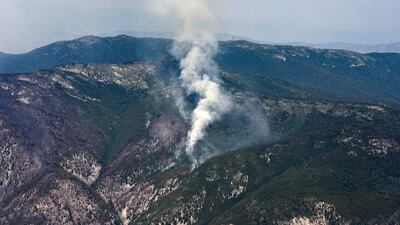Hundreds of bushfires are raging across Canada’s westernmost province of British Columbia following a deadly heatwave that smashed high-temperature records.
At the last count, 205 fires were burning in British Columbia, though the province's premier, John Horgan, has stopped short of declaring a state of emergency.
“We’re confident that every resource that can be mustered is being mustered,” he said at a news conference in Kamloops, near the province's largest bushfire.
Mr Horgan and other officials flew over some of the fires burning across the province on Tuesday. A record hot spell at the end of June caused temperatures in parts of British Columbia to reach well above 40°C.
In Lytton, the mercury climbed to 49.6°C, the hottest temperature ever recorded in Canada. Shortly after the heatwave, a bushfire engulfed the small town, forcing the removal of more than 200 people. At least two people died in the fire.
Provincial bushfire services have said the fire in Lytton was probably caused by humans.
Bushfires are an annual summer occurrence in western Canada and Mr Horgan told British Columbians that fire season was only just beginning.
“I want to remind people it's the first week in July and we have a long summer ahead of us. We're not under any illusion that the crisis has passed,” he said.
The provincial government’s bushfire dashboard showed that 19 new fires have been reported in the last two days and 111 in the last week.
British Columbia is not alone, with fires raging in several states across the western US, including Oregon, California and Arizona.
In addition to western Canada, the US states of Washington and Oregon have also been suffering record temperatures and several hundred deaths from the heatwave have been reported.
Experts said the recent heat events experienced in western parts of North America are a result of climate change.
Swedish climate activist Greta Thunberg tweeted “heat records are usually broken by tenths of a degree — not 4.6°C”, referring to the heat record broken by the town of Lytton and the previous Canadian high of 45°C.
Natalie Hasell, warning preparedness meteorologist for Environment and Climate Change Canada, told CTV News that Canadians should expect extreme weather events to occur with more frequency as the planet continues warming.


